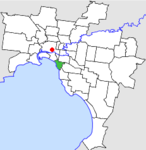National Theatre, Melbourne
AC with 0 elementsClassical music in AustraliaDance education in AustraliaMusic schools in AustraliaPerforming arts in Melbourne ... and 2 more
Theatres in MelbourneUse Australian English from March 2015

The National Theatre is a 783-seat Australian theatre and theatrical arts school located in the Melbourne bayside suburb of St Kilda, on the corner of Barkly and Carlisle Streets. The building was constructed in 1921 as The Victory Theatre (3000 seat cinema), rebuilt as 2550 seat cinema in 1928, finally converted to a live venue 1972/4 with 783 seats.
Excerpt from the Wikipedia article National Theatre, Melbourne (License: CC BY-SA 3.0, Authors, Images).National Theatre, Melbourne
Carlisle Street, Melbourne St Kilda
Geographical coordinates (GPS) Address External links Nearby Places Show on map
Geographical coordinates (GPS)
| Latitude | Longitude |
|---|---|
| N -37.8668542 ° | E 144.9809236 ° |
Address
National Theatre
Carlisle Street
3182 Melbourne, St Kilda
Victoria, Australia
Open on Google Maps









